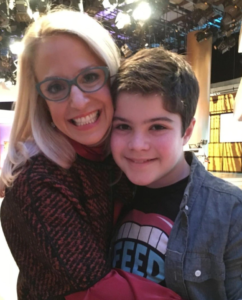Dr. Laura Berman on Unprocessed Grief & Trauma in the Body.

When grief seeps into our bodies, it’s not uncommon to want to shut down. Sometimes, it might even be necessary. But today, Dr. Laura Berman — relationship therapist, radio and TV host, and mother still reckoning with the death of her teenage son — talks to David about what happens when we DON’T release the pain of grief from our bodies. There’s no sugar coating in this conversation. Dr. Berman lets us into her experience with breast cancer, her son’s fatal fentanyl poisoning, her family’s different grieving styles — and how she lets even the wildest expressions of her grief come to the forefront in safe and healing ways. For more help, support and resources, please visit grief.com

Dr. Laura Berman is a world-renowned and well-loved sex, love and relationship therapist. She earned two Masters Degrees and a PhD from New York University, and has spent the past 30 years devoting her career to helping others learn to love and be loved better from a mind, body and spiritual perspective.
Dr. Berman has been sharing her wisdom in public forums for decades. She was a regular guest on The Oprah Winfrey Show and has since continued to be a sought-after expert, frequently offering advice on-air and on television. She has appeared on almost every major daytime and national news television show, and been featured in most major news and magazine publications in the United States. Dr. Berman is New York Times best-selling author of 9 books, and an award-winning syndicated radio host. She currently hosts the popular love and sex advice podcast, The Language of Love.
Thank you for joining me today as I share a conversation with the brilliant Dr. Laura Berman. Dr. Laura Berman is a leading relationship therapist and educator. She is a former Oprah Winfrey regular and the author of nine books including two best-selling books.
Laura has experienced many forms of grief, including her mother’s death and a battle with breast cancer. Her son Sam died in February 2021 when he was poisoned with Fentanyl that he’d purchased from someone on Snapchat while he was sheltered in their family home.
Laura generously shares tips and tools that she uses to express and move through her grief and I think that you will find them helpful. Laura is genuine and vulnerable and is a light to help navigate the dark days of grief.
I hope that this discussion will be helpful to you.
Resources:
To learn more about Laura Berman you can find her at https://drlauraberman.com/
To learn more about Paul Denniston and Grief Yoga visit GriefYoga.com
www.tenderheartssupport.com - David's online grief support group, Tender Hearts
www.aboutgrief.com - Understanding loss and grief
www.lossofaparent.com - Death of a parent
www.parentforever.com - Death of a child and sibling
www.griefsuicide.com - Death of a loved one by suicide
988lifeline.org - 988 Suicide & Crisis Lifeline
nami.org - National Alliance of Mental Illness
afsp.org - American Foundation of Suicide Prevention
adultchildren.org - Adult Children of Alcoholics® & Dysfunctional Families
al-anon.org - Al-Anon Family Groups
amzn.to/31AZCPv - Finding Meaning: The Sixth Stage of Grief
actapublications.com/tear-soup - Tear Soup: A Recipe of Healing After Loss
www.elf-help.com/grief_therapy_124048.htm - Grief Therapy, Elf Help Books
Emotions are energy in motion.
Grief lives in our bodies. Laura talks about the importance of releasing our emotions and connecting with our physical bodies during grief, stress, and trauma. She shares how she prioritizes moving her body through dance, Grief Yoga, and doing body scans to see where she is in discomfort. How can you embrace the movement to engage move through your body?
Nature is healing.
After Laura’s son Sam died, she went into nature and spent time working on her grief. She went to the redwoods and stayed at a conference center. How can you spend time in nature to give your grief space? Is there a park, a hiking trail, or a body of water you can visit?
We all express grief differently.
Laura talks about how her family members all experience and express their grief in alignment with their personalities and needs. There is no one way to grieve and there is no right way. What is your grieving style? How have you seen people around you grieve differently from you?
Licensed Professional Counselors – Get listed on Grief.com

